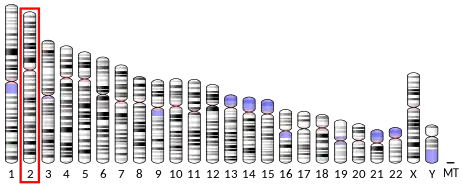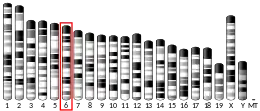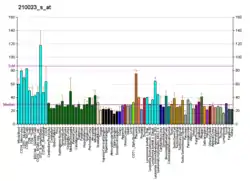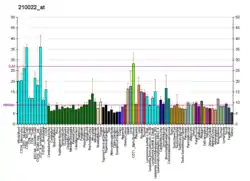PCGF1
Polycomb group RING finger protein 1, PCGF1, also known as NSPC1 or RNF68 is a RING finger domain protein that in humans is encoded by the PCGF1 gene.[5][6]
| PCGF1 | |||||||||||||||||||||||||||||||||||||||||||||||||||
|---|---|---|---|---|---|---|---|---|---|---|---|---|---|---|---|---|---|---|---|---|---|---|---|---|---|---|---|---|---|---|---|---|---|---|---|---|---|---|---|---|---|---|---|---|---|---|---|---|---|---|---|
| |||||||||||||||||||||||||||||||||||||||||||||||||||
| Identifiers | |||||||||||||||||||||||||||||||||||||||||||||||||||
| Aliases | PCGF1, 2010002K04Rik, NSPC1, RNF3A-2, RNF68, polycomb group ring finger 1 | ||||||||||||||||||||||||||||||||||||||||||||||||||
| External IDs | OMIM: 610231 MGI: 1917087 HomoloGene: 13090 GeneCards: PCGF1 | ||||||||||||||||||||||||||||||||||||||||||||||||||
| |||||||||||||||||||||||||||||||||||||||||||||||||||
| |||||||||||||||||||||||||||||||||||||||||||||||||||
| |||||||||||||||||||||||||||||||||||||||||||||||||||
| |||||||||||||||||||||||||||||||||||||||||||||||||||
| |||||||||||||||||||||||||||||||||||||||||||||||||||
| Wikidata | |||||||||||||||||||||||||||||||||||||||||||||||||||
| |||||||||||||||||||||||||||||||||||||||||||||||||||
PCGF1 is a component defining the non-canonical polycomb repressive complex 1.1 (ncPRC1) interacting with RING1A/B, RYBP, BCOR and KDM2B. [7] PCGF1-BCOR assembles via the ubiquitin-like RAWUL domain of PCGF1 and is recruited on the chromatin at KDM2B sites.[8][9][10] Within the PRC1-like complex, PCGF1 regulates RING1B ubiquitin ligase activity that catalyzes the ubiquitination of Lys119 on histone H2A, [11] which then leads to recruitment of PRC2 and H3K27me3 to effectively initiate a polycomb domain and mediate gene repression. [12][13][14]
References
- GRCh38: Ensembl release 89: ENSG00000115289 - Ensembl, May 2017
- GRCm38: Ensembl release 89: ENSMUSG00000069678 - Ensembl, May 2017
- "Human PubMed Reference:". National Center for Biotechnology Information, U.S. National Library of Medicine.
- "Mouse PubMed Reference:". National Center for Biotechnology Information, U.S. National Library of Medicine.
- Nunes M, Blanc I, Maes J, Fellous M, Robert B, McElreavey K (April 2001). "NSPc1, a novel mammalian Polycomb gene, is expressed in neural crest-derived structures of the peripheral nervous system". Mechanisms of Development. 102 (1–2): 219–22. doi:10.1016/S0925-4773(01)00288-X. PMID 11287196. S2CID 8344430.
- "Entrez Gene: PCGF1 polycomb group ring finger 1".
- Gao Z, Zhang J, Bonasio R, Strino F, Sawai A, Parisi F, et al. (February 2012). "PCGF homologs, CBX proteins, and RYBP define functionally distinct PRC1 family complexes". Molecular Cell. 45 (3): 344–56. doi:10.1016/j.molcel.2012.01.002. PMC 3293217. PMID 22325352.
- Wong SJ, Gearhart MD, Taylor AB, Nanyes DR, Ha DJ, Robinson AK, et al. (October 2016). "KDM2B Recruitment of the Polycomb Group Complex, PRC1.1, Requires Cooperation between PCGF1 and BCORL1". Structure. 24 (10): 1795–1801. doi:10.1016/j.str.2016.07.011. PMC 5088048. PMID 27568929.
- Junco SE, Wang R, Gaipa JC, Taylor AB, Schirf V, Gearhart MD, et al. (April 2013). "Structure of the polycomb group protein PCGF1 in complex with BCOR reveals basis for binding selectivity of PCGF homologs". Structure. 21 (4): 665–71. doi:10.1016/j.str.2013.02.013. PMC 4003909. PMID 23523425.
- Farcas AM, Blackledge NP, Sudbery I, Long HK, McGouran JF, Rose NR, et al. (December 2012). Struhl K (ed.). "KDM2B links the Polycomb Repressive Complex 1 (PRC1) to recognition of CpG islands". eLife. 1: e00205. doi:10.7554/eLife.00205. PMC 3524939. PMID 23256043.
- Taherbhoy AM, Huang OW, Cochran AG (July 2015). "BMI1-RING1B is an autoinhibited RING E3 ubiquitin ligase". Nature Communications. 6: 7621. Bibcode:2015NatCo...6.7621T. doi:10.1038/ncomms8621. PMID 26151332.
- Tamburri S, Lavarone E, Fernández-Pérez D, Conway E, Zanotti M, Manganaro D, Pasini D (February 2020). "Histone H2AK119 Mono-Ubiquitination Is Essential for Polycomb-Mediated Transcriptional Repression". Molecular Cell. 77 (4): 840–856.e5. doi:10.1016/j.molcel.2019.11.021. PMC 7033561. PMID 31883952.
- Fursova NA, Blackledge NP, Nakayama M, Ito S, Koseki Y, Farcas AM, et al. (June 2019). "Synergy between Variant PRC1 Complexes Defines Polycomb-Mediated Gene Repression". Molecular Cell. 74 (5): 1020–1036.e8. doi:10.1016/j.molcel.2019.03.024. PMC 6561741. PMID 31029541.
- Blackledge NP, Farcas AM, Kondo T, King HW, McGouran JF, Hanssen LL, et al. (June 2014). "Variant PRC1 complex-dependent H2A ubiquitylation drives PRC2 recruitment and polycomb domain formation". Cell. 157 (6): 1445–1459. doi:10.1016/j.cell.2014.05.004. PMC 4048464. PMID 24856970.
Further reading
- Valk-Lingbeek ME, Bruggeman SW, van Lohuizen M (August 2004). "Stem cells and cancer; the polycomb connection". Cell. 118 (4): 409–18. doi:10.1016/j.cell.2004.08.005. PMID 15315754. S2CID 16542938.
- Gong Y, Yue J, Wu X, Wang X, Wen J, Lu L, et al. (2007). "NSPc1 is a cell growth regulator that acts as a transcriptional repressor of p21Waf1/Cip1 via the RARE element". Nucleic Acids Research. 34 (21): 6158–69. doi:10.1093/nar/gkl834. PMC 1693893. PMID 17088287.
- Gearhart MD, Corcoran CM, Wamstad JA, Bardwell VJ (September 2006). "Polycomb group and SCF ubiquitin ligases are found in a novel BCOR complex that is recruited to BCL6 targets". Molecular and Cellular Biology. 26 (18): 6880–9. doi:10.1128/MCB.00630-06. PMC 1592854. PMID 16943429.
- Rual JF, Venkatesan K, Hao T, Hirozane-Kishikawa T, Dricot A, Li N, et al. (October 2005). "Towards a proteome-scale map of the human protein-protein interaction network". Nature. 437 (7062): 1173–8. Bibcode:2005Natur.437.1173R. doi:10.1038/nature04209. PMID 16189514. S2CID 4427026.
- Gong Y, Wang X, Liu J, Shi L, Yin B, Peng X, et al. (January 2005). "NSPc1, a mainly nuclear localized protein of novel PcG family members, has a transcription repression activity related to its PKC phosphorylation site at S183". FEBS Letters. 579 (1): 115–21. doi:10.1016/j.febslet.2004.11.056. PMID 15620699. S2CID 28187618.
- Sugishita H, Kondo T, Ito S, et al. (September 2021). "Variant PCGF1-PRC1 links PRC2 recruitment with differentiation-associated transcriptional inactivation at target genes". Nat Commun. 12 (5341): 5341. Bibcode:2021NatCo..12.5341S. doi:10.1038/s41467-021-24894-z. PMC 8429492. PMID 34504070.
This article is issued from Wikipedia. The text is licensed under Creative Commons - Attribution - Sharealike. Additional terms may apply for the media files.





